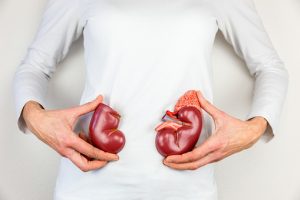 Suffering from atrophic kidney means that one kidney is smaller in size than the other. Humans are normally born with two separate kidneys located on the left and right side of the vertebral column within the abdomen. They are considered vital organs of the body and are responsible for getting rid of toxic metabolic waste and maintaining fluid volume, electrolyte balance, and secreting various hormones.
Suffering from atrophic kidney means that one kidney is smaller in size than the other. Humans are normally born with two separate kidneys located on the left and right side of the vertebral column within the abdomen. They are considered vital organs of the body and are responsible for getting rid of toxic metabolic waste and maintaining fluid volume, electrolyte balance, and secreting various hormones.
If they kidneys were to be damaged in any way, overall kidney function would be affected. If kidneys are placed under stress for prolonged periods of time—sustaining damage—atrophic kidney can occur.
What are the causes and symptoms of atrophic kidney?
Advertisement
Atrophic kidney can be caused by many different illnesses and diseases that affect the kidney system in some way. Kidneys may become diseased or nonfunctioning due to a restriction of blood supply to the organ, leading various internal kidney structures to shrink in size. This shrinkage extends to the overall size of the kidney. The following are some causes for this condition:
- Long standing kidney infections: For example, pyelonephritis, polycystic kidney, or other conditions affecting the internal structures of the kidney itself.
- Kidney ischemia: When blood supply to the kidney becomes compromised, it may lead to kidney atrophy. This can occur due to narrowing of the renal blood vessels, leading to tissue damage.
- Renal artery occlusion: Blockage of the artery supplying the kidney with oxygenated blood. This can be caused by a blood clot.
- Reflux nephropathy
- Compression of blood vessels by renal cysts
Specific underlying conditions leading to atrophic kidney may display unique signs and symptoms not seen in other documented cases. However, common symptoms of an atrophic kidney include:
- Frequent urination
- Bloody urine
- Fatigue
- Back pain
- High blood pressure
- Painful urination
- Nausea and vomiting
- Itchy skin
- Anemia
Treating atrophic kidney
Depending on the original underlying cause of the atrophic kidney, treatment will differ. Kidney shrinkage is often the result of external forces either starving the kidney of blood or directly damaging its internal structure. Knowing exactly what the pathophysiology for a particular case of atrophic kidney development is will dictate the most efficient treatment option. Kidney atrophy due to chronic kidney disease may require dialysis, and kidney atrophy caused by a chronic urinary tract infection would require antibiotics.
An atrophy can be found on one or both sides, depending on the severity of the disease. Generally, the first necessary thing is to assess how efficient current kidney function is and to then move forward from there. If one of the kidneys is found to be completely non-functional as a result of irreversible damage, there is no other option then to remove it. However, even if only minimal function remains, every attempt is made to restore kidney function to what it once was.
Atrophic kidney diet
For those who have been diagnosed with atrophic kidney or any other pathological kidney disorder, it may be useful to know what foods to consume and which to avoid, helping ease the load the kidneys need to handle. During states of kidney shrinkage or disease, its functioning cells are not working at optimum capacity, making it harder for the kidneys to do their job. The following are some food recommendations that someone with a kidney condition should be aware of:
- Limit protein intake: Helps reduce the burden on the kidneys. If desired, it is recommended to consume high-quality protein as it produces fewer waste products and supplements more essential amino acids. Such proteins include egg whites, fish, and lean meats
- Avoid salty foods: Sodium is an electrolyte balanced by the kidneys, and reducing the intake of sodium will aid in offloading kidney burden. It is recommended to avoid processed foods, salty condiments, and canned foods.
- Avoid saturated fatty acid: They have been known to induce inflammatory reactions as well as aggravate various kidney conditions.
- Avoid high potassium foods: This is also an electrolyte that can be found in foods such as bananas, dried fruits, beef, pork, and bean paste.
- Avoid purine rich foods: This includes organ meats, beef, pork, and lamb. Beer is also known to be high in purines.
Atrophic kidney can be a complicated condition that requires prolonged treatment and constant monitoring. It is important to stay in close relationship with your doctor and discuss any concerns you have about the condition.
